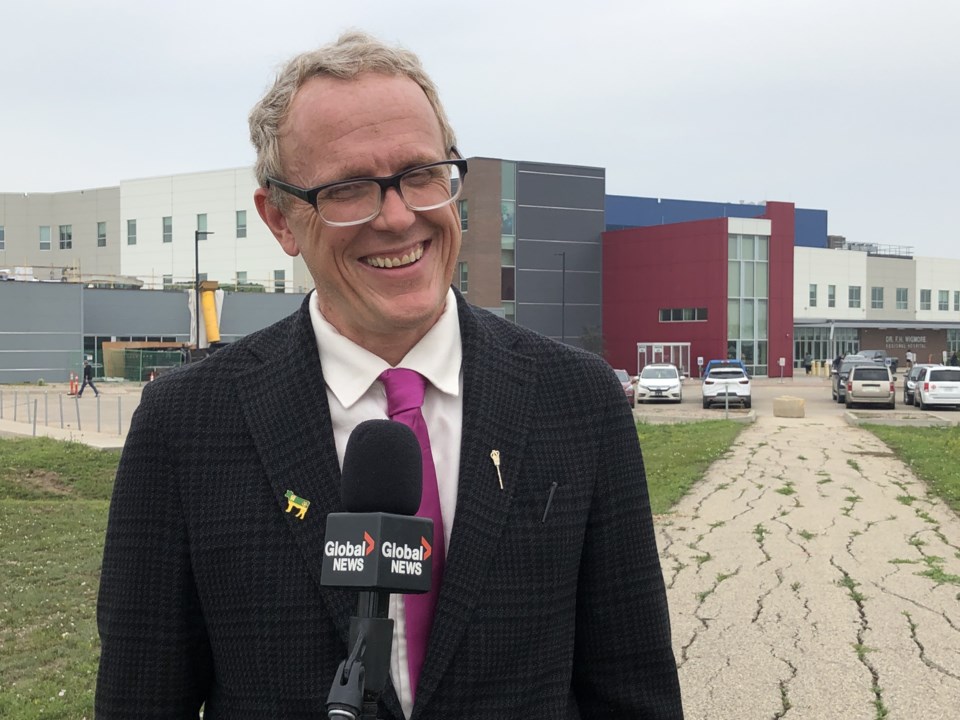MOOSE JAW — The Opposition NDP is criticizing the provincial government’s recent announcement about creating 77 “new and enhanced” health-care positions across Saskatchewan and says the province should do better at retaining existing workers.
Keith Jorgenson, NDP MLA for Saskatoon-Churchill-Wildwood, stood outside the Dr. F.H. Wigmore Regional Hospital on July 23 after the province’s news conference concluded and said the announcement does nothing “to end the chaos” that rural health care is experiencing this summer.
The province, in partnership with the Saskatchewan Health Authority, may have pledged to add 77 positions, but Jorgenson said there are 1,647 vacant health-care positions in the province, based on publicly available data.
“So my question would be, if they’ve been unable to fill those 1,647 vacant positions, what leads the public to believe (the province and SHA are) going to have success in filling these new 77 positions that they’ve created?” he said.
Continuing, Jorgenson said the disruptions that rural health care has faced are because of existing positions that are vacant, not because of part-time workers. So, instead of creating new positions, he thought the province should fill those existing spaces.
The NDP MLA alleged that the Sask. Party government has been driving health-care workers out of Saskatchewan with poor working conditions and the failure to provide “appropriate, timely pay increases.”
He also pointed out that, based on available information, Moose Jaw’s hospital experienced 231 days over the past five years where lab services or imaging services were unavailable because of vacant positions.
An NDP news release said there have been interruptions in other services, such as obstetrics and gynecology, MRIs, CT scans, basic radiography services and intensive care services. It also said that the hospital has allegedly been without emergency stabilization services for 51 days since 2020, while the hyperbaric chamber has not fully operated since closing four years ago.
“The government has to do better than this. Someone is going to die in rural Saskatchewan because of the hospital closures,” Jorgenson added.
Asked if people are just not interested in working in health care, Jorgenson said all the various training programs in the province are full. Instead, he thought the problem was one of retaining staff instead of recruiting them.
Continuing, he said he recently travelled to four rural communities that had hospital closures and heard that it was employees leaving their positions who caused the service disruptions. So, he thought the province should focus on understanding why workers are leaving and why they’re dissatisfied with their jobs.
“And if the government doesn’t go out and talk to these people, they’re never going to solve those problems and the health-care system is going to continue to deteriorate rather than improve,” Jorgenson said.
The NDP MLA reiterated that the way to retain people is to pay them appropriately, listen to them, and collaborate with rural communities. He noted that during his travels, residents allegedly told him that no one from the government had contacted them about this problem.
Continuing, Jorgenson said that if rural hospitals are facing problems, then “the buck ends” with the minister of health to deal with them. He pointed out that the NDP has “repeatedly” called for a nurses’ task force that would meet with the province in a roundtable format so front-line workers can provide ideas to improve the system.
Jorgenson alleged that Saskatchewan’s health-care system is “empirically” in last place nationally. Continuing, he said he has not heard of anywhere else in Canada where hospitals are closed for three straight weeks and where “confusing notices” are posted at health-care centres about whether the venue is open or closed or does or does not have a doctor.
“We are in a very unique and very negative position,” he added.




